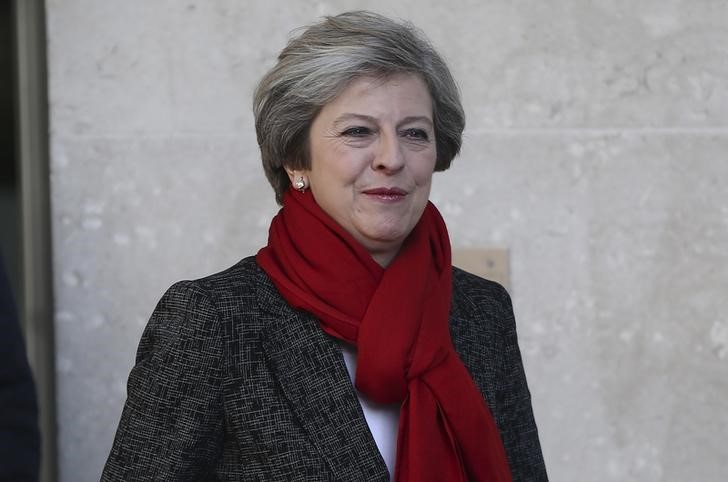(Bloomberg) -- Is a no-deal Brexit becoming more likely? U.K. Trade Secretary Liam Fox puts the chances at 60 percent. And while Theresa May sees that as an overestimate, her office has been careful not to dispute Fox’s argument that talks could collapse if the European Union doesn’t give ground.
“The prime minister has stressed on a number of occasions the importance of being pragmatic and practical in the negotiations,” May’s spokesman, James Slack, told reporters on Monday. He also referred to a February speech in Munich, in which May warned EU leaders not to allow “rigid institutional restrictions or deep-seated ideology to inhibit our co-operation.”
The government is at least partly motivated by trying to avoid public divisions over Brexit, especially on subjects as unknowable as whether talks will fail. But there’s another reason why May’s office is relaxed at the prospects of a no-deal Brexit being talked up: The more people think about the implications of crashing out of the EU, the easier it is to get them to support a compromise.
“The government forcing people to think about it now ultimately strengthens their hands,” said Sam Lowe, senior research fellow at the Center for European Reform in London. “It means thought is put into why pursuing such an outcome is foolhardy.”
Compromise
Discussing the pitfalls of not doing a deal could help May paint internal critics as extremists and herself as a champion of pragmatic compromise, especially as some opposition Labour Party lawmakers are now also thinking about supporting the agreement May brings back from Brussels if it would help the economy.
It may also help persuade the EU to give some of the ground Fox called for.
Slack described May’s Brexit proposal last month as “a significant move” to which EU countries “need to respond.” The message to Brussels is that May has spent significant political capital, and can’t go further without a reciprocal shift from the bloc. The resignations of two key ministers help to make that case -- but so does an increase in British chatter about talks collapsing.
That’s not to say Fox was doing May’s bidding. One government official pointed out that others have offered views on the odds of no deal, and Fox had simply been doing the same. Foreign Secretary Jeremy Hunt said last week the U.K. was “heading for no deal by accident,” while Bank of England Governor Mark Carney said the chances were “uncomfortably high.”
Comfortable
Unlike those two, Fox campaigned for Brexit and is instinctively more comfortable with the prospect of leaving the bloc without an agreement -- something that could also be coloring his assessment.
If it is May’s strategy to use such voices to her advantage, it’s a difficult one to get right without alienating the Brexiteers in her Conservative Party. Though they’ve spent months calling for her to walk away from negotiations, they’re now alarmed that May’s plan to publish advice on how to prepare for that scenario could make “no deal” look like a bad idea.
Part of the problem is that “no deal” means different things to different people, though most assume there would be agreements to ensure planes continue to fly between the EU and the U.K., for example, and that citizens’ rights would be taken care of.
But as May herself observed in June, even achieving that would require extensive discussions conducted in the wake of an acrimonious collapse of the main Brexit talks. All the signs point to her trying to create the conditions for a deal -- both at home and abroad.
